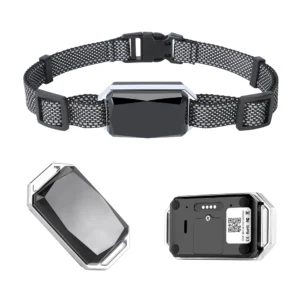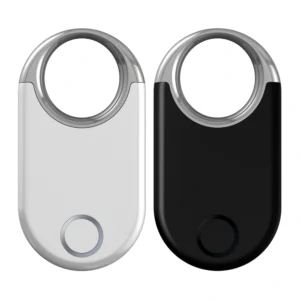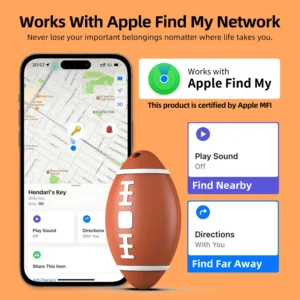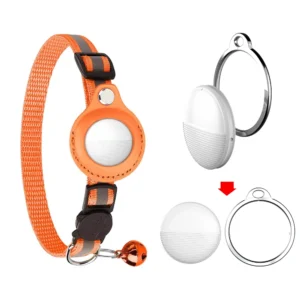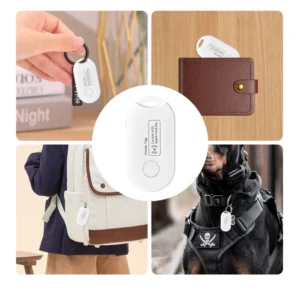Introduction: What kind of tracker do you need? Understand the fundamental difference

When you want to attach a lock to your keys or a locator to your car, you may be tempted to choose between a traditional GPS tracker or an apple AirTag? Both devices are called“Trackers,” but the location logic and context are very different.
Some people think of the AirTag as a“Mini GPS,” but it doesn’t rely on satellites at all; others think the GPS tracker is“More powerful,” but ignore its battery life. This article will break down the core differences between the two devices to help you decide: which device is more suitable for your needs?
What is a GPS tracker? What is an AirTag?
First clear the nature of the two devices positioning, to avoid confusion from the beginning.
1. GPS trackers: “Active trackers” based on satellite positioning
GPS tracker is a kind of positioning device which depends on satellite signals. Its core function is to master the location of moving target in real time.
![]()
It built-in GPS module, by receiving signals from global satellites (such as the United States GPS, EUROPE GALILEO-RRB- to calculate the precise coordinates;
Then through the cellular network (4G/5g/NB-IoT) or satellite communications, the location data will be sent to the mobile App to achieve remote viewing;
Common uses: anti-theft vehicles, outdoor positioning pets, logistics tracking goods, the elderly and children’s guardianship.
2. Apple AirTag: a“Passive finder” powered by Bluetooth and social networking
![]()
AirTag is a bluetooth smart tag from Apple. Its core function is to help you find your lost everyday items.
It has no GPS module and only communicates with the surrounding iPhone via Bluetooth low energy (BLE)
When your AirTag is lost, hundreds of millions of iphones, ipads and Macs around the world automatically detect its signal and anonymously upload its location to Apple’s“Find” network
On your iPhone, you can see where airtags have been“Accidentally” encountered
Common uses: keys, wallets, backpacks, suitcases, and other small items.
3. The core working principle contrast: positioning method is different
| Dimensions of comparison | GPS tracker | Apple AirTag |
| Location Technology | Satellite (GPS) + cellular data | Bluetooth + Apple to find the network |
| Is there a built-in GPS module | Yes | No |
| Do you need to connect to the internet | Yes (usually with a SIM card) | You Don’t need to be connected to the Internet, but you can upload it from your iPhone |
| Can it be tracked around the world | Global (with a signal) | Rely on iPhone users’ networks to upload location |
Tracking power versus accuracy
GPS tracker: real-time, accurate, crowd-free
Real-time tracking: with satellite signals and cellular networks, you can update your location every second or minute, and even see where your target is moving on a map (like which road your car is on) .
High accuracy: outdoor positioning error is usually 5-10 meters, some high-end models (such as vehicle-mounted GPS) can be accurate to within 1 meter.
Adapt to complex environments: in remote mountains, highways, oceans and other“No man’s land”, as long as the satellite signal can be received, can be normal positioningー does not rely on other equipment.
AirTag: non-real-time, context-dependent, more accurate at close range
Non-real-time location: location updates are all ‘chance encounters’-new locations are only uploaded if there is an iPhone near the AirTag. If it’s left in the middle of nowhere, it may not be updated for days.
Precision depends on the environment: in the iPhone dense city, the positioning error can be reduced to 10-30 meters; in rural or remote areas, the error can expand to hundreds of meters or even unable to locate.
Proximity Advantage: if you have an iPhone with ultra-wideband (UWB) technology (e.g. , iPhone 11 and above) , you can enable“Precision Lookup” when you’re near an AirTag-the screen will show you direction and distance, it acts like a compass to find the key hidden in the crevice of your sofa, to within a few centimetres.
Battery versus battery life
GPS trackers: short battery life and frequent maintenance
Because of the constant need to receive satellite signals and transmit data, GPS trackers use up power quickly:
Small, portable models (such as PET collar GPS) typically last 3-7 days and require frequent recharging
Car GPS mostly plug-in, or with a large capacity battery (battery life 1-3 months) , but the larger size;
Long-term use needs to develop a“Regular charge” habit, otherwise it may be at a critical moment“Strike”.
AirTag: long life, almost no charge
Powered by a single CR2032 button battery, it lasts up to a year — 365 days with 16“Probes” a day, according to Apple.
When there is no power just unscrew the back cover for a new battery (cost about 2-3usd) , no charging cable, the operation is as simple as changing the battery remote control.
For users, it’s a“Use it and forget it” option, requiring maintenance only once a year.
What works for you: which is better for You?
![]()
1. GPS trackers are better for situations that require active, real-time monitoring
Vehicle tracking/anti-theft: equip your car with a GPS that allows you to see your route in real time if it is stolen, or even lock your car remotely-the AirTag can’t be tracked in real time and is easily dismantled by thieves.
Outdoor location: Pets often run in the wild, the elderly love to go for a walk in the mountains, children participate in outdoor camping, GPS can be located continuously in the“IPhone-free Zone” to ensure safety.
Logistics/bulk cargo: when shipping containers and trucks, GPS is the only way to know their location and driving status in real time.
2. AirTag is better suited for: everyday anti-loss, urban-dependent scenarios
Small items: Keys, wallets, headsets and other“Misplaced” items, aIRTAG’s“Audible alert” and“Separation alarm”(when the phone vibrates at a certain distance) can directly address the problem.
Urban/indoor finders: airtags are highly efficient at locating“IPhone-heavy areas” such as shopping malls, subways, and homes — for example, backpacks left in cafes, it can be“Tagged” within 10 minutes by a nearby iPhone user.
Seamless experience for iPhone users: directly integrated into the iOS“Find” App, no need to download new apps, ready to use out-of-the-box pairings, “Zero learning cost” for Apple ecosystem users.
Price vs. threshold
GPS trackers are expensive and complicated to operate
Price range: from 50USD (Basic Pet GPS) to 300USD (high-end car GPS) , generally more expensive than AirTag.
Additional costs: most require a SIM card (or built-in eSIM) and cost about 3-10 USD per month for data — more for long-term use.
Use Threshold: need to download special App, set the positioning frequency, electronic fence, alarm mode, etc. , some models also need to activate SIM card, not very friendly to novice.
AirTag: cost-effective, zero threshold operation
Price: about 29 USD for one, and 99 USD for four (an average of 25 USD) , cheaper than most GPS trackers.
No extra costs: NO SIM card, no monthly fees, one purchase for lifetime use of basic features.
Easy to use: an iPhone user can open the find App, tap AirTag to find a match, and set up a“Split reminder” within 30 seconds — even without reading the instructions.
Security and privacy
GPS tracker: high privacy risk, weak ability to prevent abuse
Most GPS trackers don’t have anti-tracking capabilities, and once installed surreptitiously by someone else (such as in your car) , they can be monitored for extended periods of time.
Some brands have“Authorized access” but are far less secure than airtags.
AirTag: multiple anti-tracking design, more privacy protection
Auto-alerts: if your AirTag is away from your iPhone for extended periods of time, it will automatically send an“Unknown AirTag tracking” alert to nearby iphones, as well as an audible alert to the person being tracked.
Data Encryption: all location data is encrypted end-to-end, and Apple can’t see your AirTag location — to the maximum extent possible.
Transparency and control: all paired airtags can be seen in the find App without fear of being manipulated.
Summary: GPS and airtags have their pros and cons, and the choice depends on your use
If you need real-time tracking of cars, outdoor pets, children or the elderly, or in“No man’s land” location-choose GPS tracker, its active location ability can not be replaced.
If you just want to keep your keys, wallet, or backpack from getting lost, and you live in a city (lots of iPhone users)-the AirTag, with its long battery life, low price, and ease of use, makes for a better experience.
Put simply: a GPS tracker is“An active surveillance bodyguard,” and an AirTag is“An assistant who helps you find things.”. Figuring out whether you want to be“Watched” or“Found” will make the choice much easier.

